特殊会话含义
会话含义理论及其翻译-最新资料
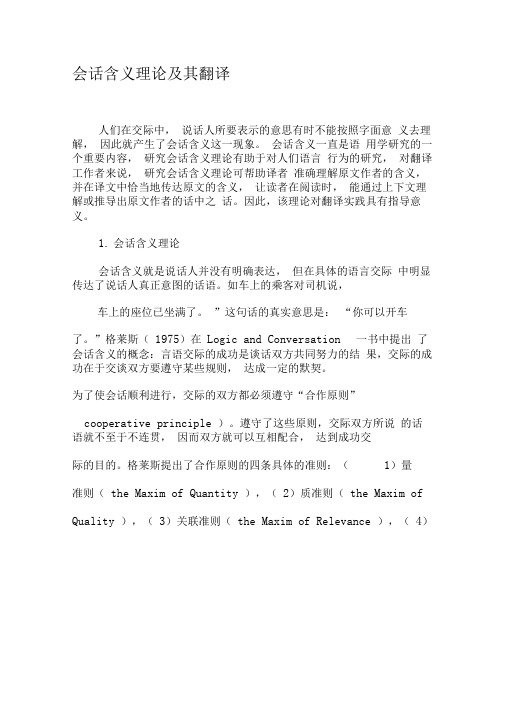
会话含义理论及其翻译人们在交际中,说话人所要表示的意思有时不能按照字面意义去理解,因此就产生了会话含义这一现象。
会话含义一直是语用学研究的一个重要内容,研究会话含义理论有助于对人们语言行为的研究,对翻译工作者来说,研究会话含义理论可帮助译者准确理解原文作者的含义,并在译文中恰当地传达原文的含义,让读者在阅读时,能通过上下文理解或推导出原文作者的话中之话。
因此,该理论对翻译实践具有指导意义。
1.会话含义理论会话含义就是说话人并没有明确表达,但在具体的语言交际中明显传达了说话人真正意图的话语。
如车上的乘客对司机说,车上的座位已坐满了。
”这句话的真实意思是:“你可以开车了。
”格莱斯(1975)在Logic and Conversation 一书中提出了会话含义的概念:言语交际的成功是谈话双方共同努力的结果,交际的成功在于交谈双方要遵守某些规则,达成一定的默契。
为了使会话顺利进行,交际的双方都必须遵守“合作原则”cooperative principle )。
遵守了这些原则,交际双方所说的话语就不至于不连贯,因而双方就可以互相配合,达到成功交际的目的。
格莱斯提出了合作原则的四条具体的准则:(1)量准则(the Maxim of Quantity ),(2)质准则(the Maxim of Quality ),(3)关联准则(the Maxim of Relevance ),(4)方式准则( the Maxim of Manner )。
在交际过程中,交谈双方遵守这些准则就是遵守合作原则。
然而,在实际交际中,人们常常会因为某种原因而违反这些准则,这就产生了会话含义。
格莱斯的会话含义理论就是建立在对合作原则及其准则的遵守与违反上的。
格莱斯进一步把会话含义分为一般会话含义和特殊会话含义。
会话中听话人无须借助某些特定的背景知识就能推导出说话人的会话含义的称为一般会话含义,但是,在许多情况下,会话隐含的含义只有参与交际的双方对某一特殊的语境共享时,才能通过推导得出,这种会话含义就是特殊会话含义。
会话含义理论在中国话剧作品中的应用
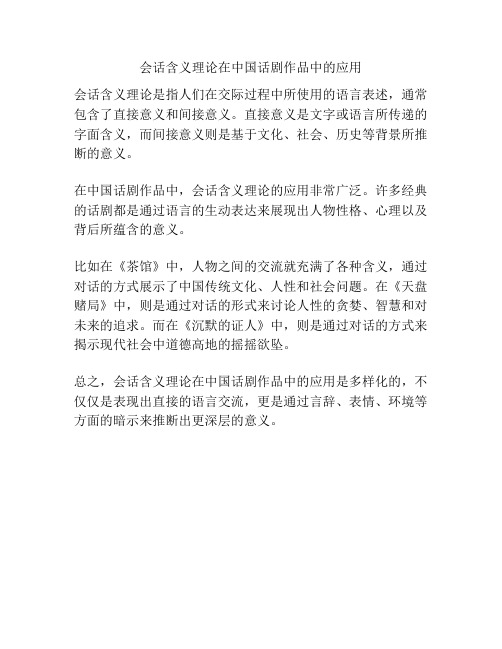
会话含义理论在中国话剧作品中的应用
会话含义理论是指人们在交际过程中所使用的语言表述,通常包含了直接意义和间接意义。
直接意义是文字或语言所传递的字面含义,而间接意义则是基于文化、社会、历史等背景所推断的意义。
在中国话剧作品中,会话含义理论的应用非常广泛。
许多经典的话剧都是通过语言的生动表达来展现出人物性格、心理以及背后所蕴含的意义。
比如在《茶馆》中,人物之间的交流就充满了各种含义,通过对话的方式展示了中国传统文化、人性和社会问题。
在《天盘赌局》中,则是通过对话的形式来讨论人性的贪婪、智慧和对未来的追求。
而在《沉默的证人》中,则是通过对话的方式来揭示现代社会中道德高地的摇摇欲坠。
总之,会话含义理论在中国话剧作品中的应用是多样化的,不仅仅是表现出直接的语言交流,更是通过言辞、表情、环境等方面的暗示来推断出更深层的意义。
浅析会话含义理论及其对日常交际的启示日语生活交际会话音频
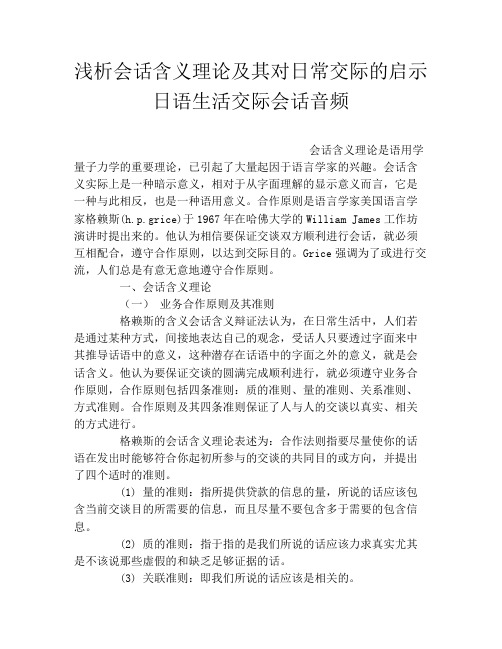
浅析会话含义理论及其对日常交际的启示日语生活交际会话音频会话含义理论是语用学量子力学的重要理论,已引起了大量起因于语言学家的兴趣。
会话含义实际上是一种暗示意义,相对于从字面理解的显示意义而言,它是一种与此相反,也是一种语用意义。
合作原则是语言学家美国语言学家格赖斯(h.p.grice)于1967年在哈佛大学的William James工作坊演讲时提出来的。
他认为相信要保证交谈双方顺利进行会话,就必须互相配合,遵守合作原则,以达到交际目的。
Grice强调为了或进行交流,人们总是有意无意地遵守合作原则。
一、会话含义理论(一)业务合作原则及其准则格赖斯的含义会话含义辩证法认为,在日常生活中,人们若是通过某种方式,间接地表达自己的观念,受话人只要透过字面来中其推导话语中的意义,这种潜存在话语中的字面之外的意义,就是会话含义。
他认为要保证交谈的圆满完成顺利进行,就必须遵守业务合作原则,合作原则包括四条准则:质的准则、量的准则、关系准则、方式准则。
合作原则及其四条准则保证了人与人的交谈以真实、相关的方式进行。
格赖斯的会话含义理论表述为:合作法则指要尽量使你的话语在发出时能够符合你起初所参与的交谈的共同目的或方向,并提出了四个适时的准则。
(1) 量的准则:指所提供贷款的信息的量,所说的话应该包含当前交谈目的所需要的信息,而且尽量不要包含多于需要的包含信息。
(2) 质的准则:指于指的是我们所说的话应该力求真实尤其是不该说那些虚假的和缺乏足够证据的话。
(3) 关联准则:即我们所说的话应该是相关的。
(4) 方式准则:即我们应该清晰明再说了的说出所要说的话,尤其应该消除晦涩、歧义的产生,语言要简练、有条理(Cummings, 2005)。
(二)一般性会话含义及特殊性会话含义一般来说,会话含义分为两类:一般性会话含义和独特性会话含义。
一般性会话含义指不需要特殊语境就能推导出来的暗指含义。
比如下面的例句:a. Do you like Betty and Cathy? (b & c?)b. I like Betty.当A问B是不是喜欢Betty 和Cathy,B的回答是喜欢Betty,那么从B的回答中,A可以推测出B不喜欢Cathy。
会话含义

enormous intellect/a big brain”(反语),含意是“ Jack非常愚蠢。”
§1.4会话含义的特征
4.可推导性( calculability),听话人在认识到合作原则和准则的条件下, 从所听到的话语中推导出会话含义来。 5.非规约性( non-conventionality)指会话含意不是话语的规约意义。会话 含意是根据合作原则中的各条准则,通过话语的字面意义,结合语境推导 出来的。先有字面意义,才有语用含意。 例如“ It’s cold here”,在某一特定语境中可能表示“关窗”的含意;但
1)是基本肯定它,对它的准则尤其是量准则做更具体更精细的形式化分析
。
2)是在认同“合作原则”的基础上,补充别的原则。 3)是完全抛开“合作原则”而另立原则。
Levinson说自己的努力,只不过是“对古典格赖斯一般会话含义理论运用的
具体例释”,并说自己提出的原则是对Grice的各项准则作了“有点新古典意味” 的阐释。
勤恳任劳任怨,或说他工作方法机械呆板,缺少灵活性,或这些含义都有,只
有依据具体的语境,才能确定话语究竟是哪一种含义。会话含义具有不确定 性,它与各种语义理论通常假设的稳定不变的意义不同。
§1.4 会话含义的特征
3.不可分离性( non-detachability)指一句话所具有的含义是以这句话的整
单词、词语本身所具有的规约意义决定的。 例如,He is a sportsman, therefore, he is strong.这句话中的therefore这个 词的词义决定了这句话的规约性意义,即he is strong是he is a sportman的 结果。
§1.1会话含义
话语的“直说的内容”和“含蓄的内容”之间的区别相当于“意义”和“用意”之间的
会话含义与合作原则

会话含义与合作原则美国语言哲学家格赖斯为了保证谈话顺利进行,谈话双方必须共同遵守一些准则,特别是在1967年提出的“合作原则”。
当谈话一方不遵守合作原则而又不是为了说谎为目的即故意违反准则,于是就产生会话含义。
会话含义就是一种超出语句本身意义范围的意义,即说话者的“言外之意”。
一般来说,人们可以通过违反合作原则中的质、量、关系原则和利用方式准则来表达或推导出会话含义,来表达与字面意思不同的没有说出来的含义,回避志杰说出想表达的意思,含蓄的表达自己的真实意图。
会话含义一般可以分为两类:一般含义和特殊含义。
一般含义是指在遵守合作原则中的默想准则是带有的含义。
特殊含义是指在有意违反合作原则中的某项原则,在特定的语境中推导出来的含义。
会话含义的特征可以归纳为:可取消性、不可分离性、可推导性、非规约性和不确定性。
概要:一、会话含义的由来二、合作原则的几项原则:质的原则量的原则关系原则礼貌原则三、会话含义的产生方法:违反质的原则:故意提供不足的信息,提供没有必要的信息违反量的原则:说一些不符合事实的话;说一些荒唐的话违反关系原则利用礼貌原则:使用有歧义的词语:使用不必要的词语;打乱叙述顺序四、会话含义的种类:一般会话含义和特殊会话含义五、会话含义的特点:可取消性、不可分离性、可推导性、非规约性和不确定性关键词:会话含义合作原则违反谈话C onversational Implicature and Cooperative PrincipleAmerican linguistics H.P.Grice once gave in 1967.In the speech, Grice said, the two sides of the conversation must obey some basic rules, especially the “cooperative principle”, to ensure that the conversation can go on propitiously. When one side of the principle doesn’t want to lie, conversational implicature comes out. Conversational implicature is a kind of meaning, which is beyond the sentence itself. Generally speaking, people can violate the maxim of quality, quantity, and relation and use the maxim of the manner to produce conversational implicature, which send the unsaid meaning of the words. Generally speaking, conversational implicature can be divided into two kinds: generalized implicature and particularized implicature. Generalized implcature refers to an implicature, which obeys the cooperative principle and also has the meaning. Particularized implicature refers to the implicature that violates some of the cooperative principle and makes the meaning in some specially context. The features of the conversational implicature: cancelability, no detachability, calculability, non-conventionality and indeterminacy:Key words:Conversational implicature cooperative principle violate conversationC onversational Implicature and Cooperative PrincipleAmerican linguistics H.P.Grice once gave speeches in 1967.In the speech. Grice said, the two sides of the conversation must obey some basic rules, especially the “cooperative principle”,to ensure that the conversation can go on propitiously. He believed the two sides of the conversation should have a same wish: the two sides can understand each other. So both of them obey some cooperative principles to achieve the aim. However, Grice said, not all the people in the conversation obey the rules. Once one side finds the other side not obey the cooperative principle, he will make himself try his best to understand the unsaid meaning in the conversation. So the conversational implicature comes out.As the conversational implicature has a close relationship with the co operational principle, we will introduce the cooperative principle first. In a conversation, the participants must first of all be willing to cooperate;Otherwise, it would not be possible for them to carry on the talk. This general principle is called the cooperative principle.There are four main maxims in the cooperative principle:●The maxim of quality: make your contribution as informative as required(for thecurrent purpose of the exchange);Do not make your contribution more informative than is required.●The maxim of quality: do not say what you believe to be false; do not say that forwhich you back adequate evidence.●The maxim of relation: the words have a relationship with other factors.The maxim of manner: avoid obscurity of expression; avoid ambiguity; be brief (avoid unnecessary prolixity); be orderly.The conversational implicature is a meaning out of the sentence itself; it is the speaker’s meaning under the literal. In the real life, people often violate some principles to sent some dark meaning.The meaning related with the cooperative principle may become by the following ways:First, to violate the maxim of quality1.Offer the deficient information on purpose.E.g.:One farmer meets Sam and says:“Hey, Sam, my horse’s got distemper. What did you give yours hen he had it?”“Turpentine,” grunted Sam.A week later they meet again and the first farmer shouts:“Sam, I gave my horse turpentine like you said and it killed him.”“S o did mine.” nodded Sam.第一位农妇的真正目的不仅是向Sam了解马病用了什么药,而且想了解治疗的结果,但通过对话它实际上只达到了一半的目标。
会话含义——精选推荐
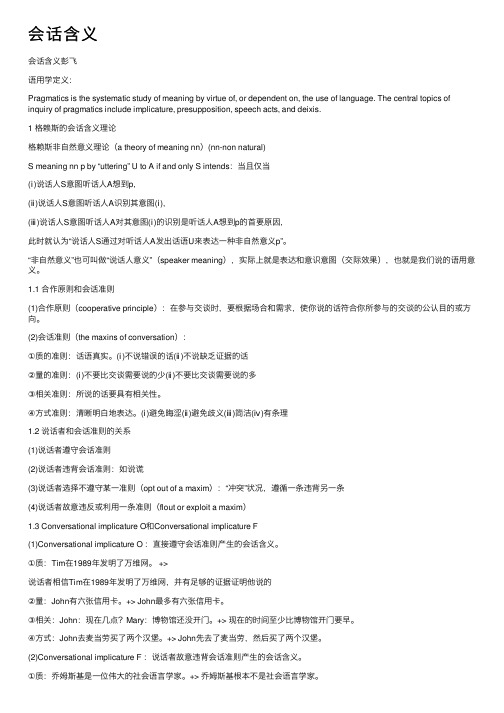
会话含义会话含义彭飞语⽤学定义:Pragmatics is the systematic study of meaning by virtue of, or dependent on, the use of language. The central topics of inquiry of pragmatics include implicature, presupposition, speech acts, and deixis.1 格赖斯的会话含义理论格赖斯⾮⾃然意义理论(a theory of meaning nn)(nn-non natural)S meaning nn p by “uttering” U to A if and only S intends:当且仅当(ⅰ)说话⼈S意图听话⼈A想到p,(ⅱ)说话⼈S意图听话⼈A识别其意图(ⅰ),(ⅲ)说话⼈S意图听话⼈A对其意图(ⅰ)的识别是听话⼈A想到p的⾸要原因,此时就认为“说话⼈S通过对听话⼈A发出话语U来表达⼀种⾮⾃然意义p”。
“⾮⾃然意义”也可叫做“说话⼈意义”(speaker meaning),实际上就是表达和意识意图(交际效果),也就是我们说的语⽤意义。
1.1 合作原则和会话准则(1)合作原则(cooperative principle):在参与交谈时,要根据场合和需求,使你说的话符合你所参与的交谈的公认⽬的或⽅向。
(2)会话准则(the maxins of conversation):①质的准则:话语真实。
(ⅰ)不说错误的话(ⅱ)不说缺乏证据的话②量的准则:(ⅰ)不要⽐交谈需要说的少(ⅱ)不要⽐交谈需要说的多③相关准则:所说的话要具有相关性。
④⽅式准则:清晰明⽩地表达。
(ⅰ)避免晦涩(ⅱ)避免歧义(ⅲ)简洁(ⅳ)有条理1.2 说话者和会话准则的关系(1)说话者遵守会话准则(2)说话者违背会话准则:如说谎(3)说话者选择不遵守某⼀准则(opt out of a maxim):“冲突”状况,遵循⼀条违背另⼀条(4)说话者故意违反或利⽤⼀条准则(flout or exploit a maxim)1.3 Conversational implicature O和Conversational implicature F(1)Conversational implicature O :直接遵守会话准则产⽣的会话含义。
Conversational_Implicature__会话含义_
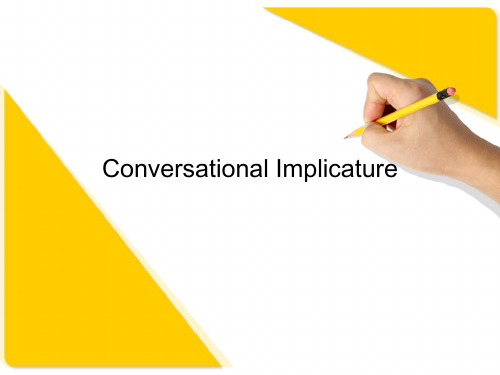
U →由语言符号构成的话语
Z →粗略地代表在听话人那儿产生的信仰或意志力, 或作出的反应。 Grice 的“非自然意义理论”实际上是一种交际理论 ( a theory of communication)。
2.2 Conversational Implicature Unlike conventional implicatures, conversational implicatures are produced by relating to the conversational context. To know what people mean, we have to interpret what they say. But interpretation is a tricky affair, and misunderstandings are always possible. As Leech remarks, ‘interpreting an utterance is ultimately a matter of guesswork’. e.g. A: When is Tom’s birthday? B: It’s sometime in October. B’s implicature: the only thing he remembered about Tom’s birthday was the month in which it occurs, and that he honestly didn’t know whether it was at the beginning, the middle or the end of that month.
the sunset.
The capital of France is Paris and the capital of England is London.
“规约含义”与“会话含义”的本质及其异同-文档资料

“规约含义”与“会话含义”的本质及其异同一、引言规约含义和会话含义是语言哲学家格赖斯(Grice)提出的有关语言意义的一对重要概念。
格赖斯认为话语的意义可以从两个方面来分析:所言和含义。
所言是句子的命题,是句子本身表达的固有和稳定不变的意义成分;而含义是说话人使用该句子时传递出的超出或不同于句子字面意思的意义成分。
含义又可进一步分为规约含义和会话含义。
规约含义和某些语言形式密不可分,而会话含义则往往与具体语境相关。
有趣的是:会话含义一经提出便在语言哲学领域获得了广泛认同,在语用学研究中占据了突出位置,但规约含义却被忽视和质疑,“在语用学舞台上已被边缘化了”。
[1]本文拟在探讨规约含义和会话含义本质的基础上,用比较异同的方式,更好地认识规约含义和会话含义,特别是会话含义中与“特殊会话含义”相对的“一般会话含义”,因为区分“规约含义”和“一般会话含义”被认为是语用研究中的一个难题。
[2]二、规约含义的本质在讨论规约含义本质前,先了解一下规约含义(包括会话含义)在整个语言意义版图中的地位:语言意义:所言含义:规约含义会话含义:一般会话含义特殊会话含义从上图可以看出,规约含义是介于句子所言和会话含义之间的一种意义。
那么,Grice所谓的规约含义是什么呢?下面是Grice1975年举的著名例子[7]:[1a] He is an Englishman; he is, therefore, brave.听到这句话的人都能感知到它包含着两层意思:[1b] He is an Englishman and he is brave.[1c] An Englishman is brave.毫无疑问,[1b]是句子所言的直义,但[1c]却不是,因为[1a]并没有直说[1c]。
那么[1c]是怎么得到的呢?[1c]是由therefore这个词自身的意义(表示因果)触发因而内含在[1a]中的。
显然,therefore的词义触发,对于[1c]含义的形成具有决定性作用。
- 1、下载文档前请自行甄别文档内容的完整性,平台不提供额外的编辑、内容补充、找答案等附加服务。
- 2、"仅部分预览"的文档,不可在线预览部分如存在完整性等问题,可反馈申请退款(可完整预览的文档不适用该条件!)。
- 3、如文档侵犯您的权益,请联系客服反馈,我们会尽快为您处理(人工客服工作时间:9:00-18:30)。
二者比较
Context 1 A:What time is it? B:Some of the guests are already
leaving. GCl:Not all of the guests are already
leaving. PCI: It mus。
二、会话含义的分类
语境在其推导的过程中所起到的作用不同
1一般会话含意(generalized conversational implicature):相对自由,它可与语境脱离。
许多比喻性的语言产生一般会话含意。比 如,大 部分比喻和习语脱离了语境也能 理解,人们通常把“He spilled the beans”理解为“他泄露了秘密”。 2 特 殊 会 话 含 意 (particularized conversational implicature):依赖于语境。
但在具体交际中,人们会因为某种原因面 违反其准则,这样就产生了会话含意。
合作原则具体体现为4条准则
• 1.量的准则(Quantity Maxim):a.交谈所需 信息。b.交谈不要超出所需信息。
• 2.质的准则(Quality Maxim):a.不故意说假 话。b.不说缺乏足够证据的话。
• 3.关系准则(Relevant Maxim):说话要有关联。 • 4.方式准则(Manner Maxim):讲话要清楚明
特殊会话含义
• 一: • 二:
会话含义的产生 会话含义的分类
一、会话含义的产生
Grice(1975)认为,言语交际的成功是谈话 双方共同努力的结果。
言语交际的成功在于人们遵循了某些规则, 达成了某种契合。这些规则和默契Grice称 为“合作原则”(cooperative principle)
A:Where’s John? B:Some of the guests are already
leaving. GCI:Not all of the guests are already
leaving. PCI:Perhaps John has already left .
感谢您的下载让小编的努力能帮助到您, 最后一页是小编对你的谢谢哦,提醒一下, 下载好了几个全部自己看一遍,把用不上 的删除哦!包括最后一页!
